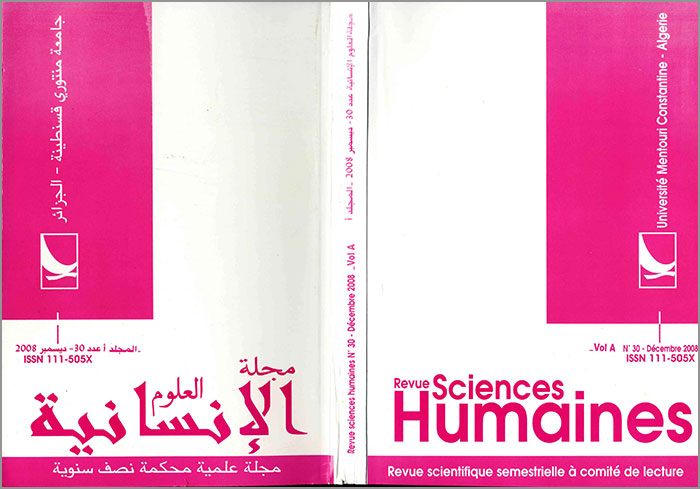RANSOM ANDTHE FUGITIVE MOVEMENT: Break and Continuity
الملخص
Abstract:
The purpose of this paper is to put forward the argument that there exits a clear and logical relationship between the Fugitive-Agrarian movements and New Criticism. This relationship is determined by the sum of beliefs and attitudes that the major Agrarians, namely John Crowe Ransom, Donald Davidson and Allen Tate shared and defended either collectively or individually. In so far as these beliefs express a reaction against the modern world, with at the background the drastic changes that were taking place in the American South in the 1930’s, they represent an “ideology”. What should therefore emerge from this study is that the joint adventure of these writers finds its essential unity in the dominant theory of Agrarianism. Such an intention invites a consideration of the historical and cultural contexts that made a group of Southern writers become respectively, Fugitive Poets, Southern Agrarians, and, finally, New Critics whose views and multifaceted inquiries constitute an important contribution to the Southern Literary Renaissance.
التنزيلات
المراجع
-The Fugitive, vol. I, no. 4, Editorial (December 1922)
- The Fugitive, vol. 2, no. 7 (June- July 1923), 66.
- Hervey Allen, Tennessee Historical Quarterly, vol. 3 (March 1944), 12.
- The Fugitive, vol. I, no. 3 (October 1922), 66.
- John Tyree Fain and Thomas Daniel Young, The literary Correspondence of
Donald Davidson and Allen Tate (Athens: University of Georgia Press, 1974).
- Donald Davidson, “The Thankless Muse and her Fugitive Poets,” Southern writers in the Modern World ( Athens, University of Georgia Press, 1974), 79.
The Fugitive, vol. I, no. 1 June-July 1922), 3
- The Literary correspondence of Donald Davidson and Allen Tate, 80.
- Ibid. 82.
- Allen Tate, Poems, 1920-1925: A Selection, Eyre and Spottiswoode, Eds, (London, 1947), 49.
- Louis D. Rubin, Jr., The faraway Country/ Writers of the Modern South (Seattle: University of Washington Press, 2003), 9.
- Allen Tate,” The Fugitive 1922-1925: A Personal Recollection Twenty Years After,” vol. 3 (Princeton University Library Chronicle), 79.
- The Fugitive, vol. 3, no. 4 (August 1923.)
- Allen Tate, “The Fugitive 1922-1925: A Personal Recollection,” 83.
- Allen Tate and Peter Smith, I’ll Take My Stand: The South and the Agrarian Tradition. (New York, 1951) .ix.
- Ibid., xix.
- J.C. Ransom, “Reconstructed but Unregenerate”, in I’ll Take My Stand, 10.
- Ibid., 12.
- Alexander Karanikas, Tillers of a Myth (Milwaukee, Madison: University of Wisconsin Press, 1966) 75.
- John Crowe Ransom, “Reconstructed but Unregenerate” I’ll Take My Stand,
- Ibid.
- Thomas Daniel Young and George Core, Eds., The Selected Letters of John Crowe Ransom (Baton Rouge and London: Louisiana State University Press, 1985), 169.
- John Crowe Ransom, quoted by J.L. Stewart in Seven Modern American Poets, London, Oxford University Press, 1967, 156.
- John Crowe Ransom, “The Future of Poetry,” The Fugitive, vol. 3, no. 1 (February 1924), 2.
- J.L. Stewart, The Burden of Time: The Fugitives and Agrarians (New Jersey: Princeton University Press, 1965), 139.
- John Crowe Ransom, The New Criticism, New Directions, New York, Connecticut, 1941, 281.
- John Crowe Ransom, The World’s Body,” Forms and Citizens”, Kennikat Press, Inc., Port Washington, New York, 1964, 41.
- Ibid.
- Ibid.
- Ibid.
- Allen Tate, “The Present Function of Criticism,” On the Limits of Poetry”, (New York,: The Swallow Press and William Morrow and Company, 1948), 8.
















